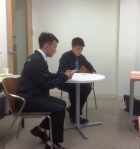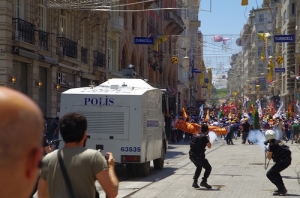High school student Janani Rangarajan shares her reactions and analysis of week four’s lesson on Turkey.

Recep Tayyip Erdoğan and Vladimir Putin shaking hands in Moscow
The political trajectories of Recep Tayyip Erdoğan of Turkey and Vladimir Putin of Russia have several parallels. Both leaders have used their power to boost certain industries, further centralize their governments, shift to different political positions to keep their level of influence and play up nationalism to maintain support for their increasingly authoritarian actions.
There is one slight difference: Putin had been a close adviser of Russia’s first President, Boris Yeltsin, and was even the acting President for some time while Yeltsin was indisposed. He ran for and won the Presidential office in 2000 and 2004. In contrast, Erdoğan helped establish the Justice and Development Party (AKP) in 2001 to rival the existing Turkish majority party, and it won easily in 2002.
The differences end there.
During Putin’s time in office, he was able to boost major industries, such as natural gas, by increasing foreign direct investment and governmental control over it. The economic growth that followed boosted Putin’s existing popularity and he was able to tighten his control on governmental decisions, sharply increasing centralization during his two terms. In eight years, Putin created “super districts”, removed elected governors, appointed new governors, and changed the structure of the Duma to a pure proportional representation, all without the consent of the nation. Similarly, Erdoğan’s encouragement of foreign direct investment pulled Turkey out of economic stagnation and on track to a growing economy, earning him more support. Erdoğan sharply increased the role of government in various industries with his power.
In 2008, Putin stepped down as President, as only two consecutive terms are legal, but was appointed Prime Minister. In 2012, he ran again for President and won with the potential to stay in office until 2016. Erdoğan has been Prime Minister since 2003, totaling eleven years in office, and he successfully ran for President this year as he too reached term limits. He will attempt to alter the Turkish Constitution by shaping Turkey into an “executive presidency”, conveniently in time for him to take the office next year.
When Putin was Prime Minister in 2008, one of his close allies, Dimitri Medvedev, became President. Medvedev appeared to have very little control of the government during this time and certainly not as much as Putin had in the same role. Putin retained much of his power as Prime Minister, leading to the belief that the power of the state seems to follow Putin. In 2001, when the Turkish AKP won the majority, it was actually Abdullah Gul who became Prime Minister because Erdoğan had been banned from politics for a period of time due to his past actions. However, once Erdoğan’s banishment elapsed, Gul willingly handed the position to him and became the Minister of Foreign Affairs instead.
Both Putin and Erdoğan use old national identities to rally supporters. Putin has embraced a blend of the roles of Tsar and Premier; many Russians believe in democracy, yet they feel that Russia will not be able to obtain it because of its political history. Therefore, Putin seems to be the most viable option for most Russians because he is not too extreme in either role. Erdoğan has shown extreme pride in the ways of the Ottomans, and he has managed to associate himself with the success of the Ottoman Empire.
Putin has held tight reigns on the Russian media, stopping just short of taking outright control of the sector. The Kremlin shut down NTV, the only independent TV network, and turned the newspaper Pravda into a tabloid. Erdoğan made sure that media outlets do not publish works that criticize the government, and he actually appointed one of his friends to lead a media organization to keep a watch on the material. Erdoğan has also denigrated Twitter, calling it a weapon of his enemies, and temporarily banned it for a period of time.
Both political figures have dealt with peaceful protest in similar fashion. When Putin was reelected in 2011, protests around the country erupted against what they saw as a sign of authoritarian rule. Putin ignored the protests and dispersed multiple subsequent protests, especially those in support of gay rights (Putin declared homosexuality illegal). Erdoğan has also had a zero tolerance policy for protests in recent years. In 2013, a sit-in to save Gezi Park from demolition escalated into violence once Erdoğan sent in the police who used tear-gas and rubber bullets to disperse the citizens. Erdoğan has also put limits on alcohol consumption, declaring it a threat to society, which is also how Putin justified helping institute laws forbidding public displays of homosexuality.
Since both Putin and Erdoğan have become increasingly influential over their governments, the paths of both countries seem to be advancing in the same direction. Recent election results seem to show that Russians and Turks appear not to care about the authoritarian tendencies of their heads of state as long as their economies remain prosperous. While both countries label themselves as democracies, their respective governments have demonstrated the willingness to bypass democratic processes when it suits them.
By Janani Rangarajan, Summer Institute participant, Archbishop Mitty High School


